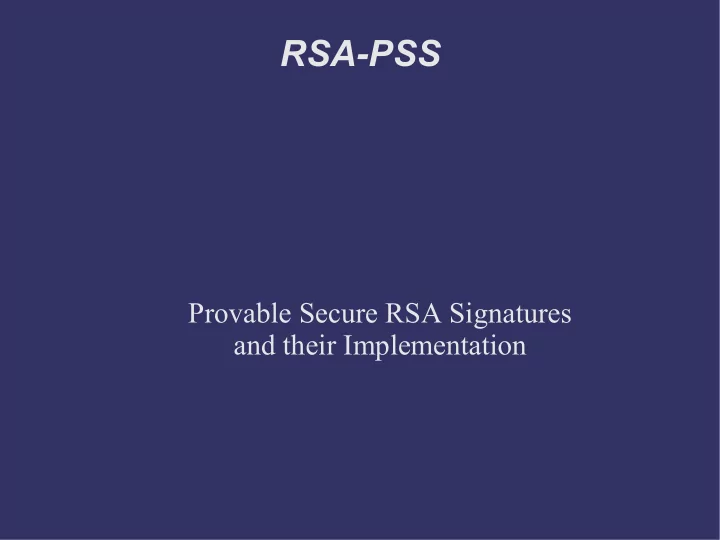

RSA-PSS Provable Secure RSA Signatures and their Implementation
Overview ➲ What is RSA-PSS? ➲ Why RSA-PSS? ➲ Comparing original and standardized PSS ➲ Status of Protocols, Standards and Imple- mentations ➲ RSA-PSS in X.509 ➲ Algorithmenkatalog
RSA ➲ Public key cryptosystem ➲ Invented 1977 by Ron Rivest, Adi Shamir, Leonard Adleman ➲ Public Key (e, N) , private key (d, N) with (X de ) mod N = X ➲ Encrypt: E = (M e ) mod N, Decrypt: M = (E d ) mod N ➲ Sign: S = (M d ) mod N, Verify: M = (S e ) mod N ➲ What is M?
Hash-then-sign, PKCS #1 v1.5
Probabilistic Signature Scheme
Probabilistic Signature Scheme ➲ Developed 1996 by Mihir Bellare and Phil- ipp Rogaway ➲ “Provable Secure” in the random oracle model ➲ That means: Secure if hash function is ideal, factoring is hard and RSA itself is as hard as factoring ➲ Uses a salt (randomization) and uses full size of RSA input
Status of PSS in standards ➲ RSASSA-PSS primitives are part of IEEE P1363a and PKCS #1 v2.1 / RFC 3447 ➲ RSASSA-PSS supported by standards for X.509 (RFC 4055), CMS (RFC 4055) ➲ Not supported in OpenPGP, DNSSEC, XM- LDsig, TLS
X.509 Implementations ➲ Latest OpenSSL 1.0.0d: bare PSS signa- tures supported, no support for X.509 ➲ X.509 Support in OpenSSL 1.1 CVS (not yet released ➲ Latest Mozilla nss / Firefox: Not supported ➲ I created patches for nss in the Google Summer of Code 2010, not yet merged ➲ Microsoft Windows (since Vista) supports X.509 with RSASSA-PSS ➲ Microsoft was faster than any other browser vendor in implementing an open standard!!
X.509 online test ➲ http://ssl.hboeck.de/
Hashing ➲ A lot has happened in hash function re- search in recent years ➲ MD5 collision in 2004 ➲ SHA-1: Collision attacks with a complexity of 2 63 ➲ Successful fake of a CA certificate in 2008 (25C3, calculated on a PS3 cluster) ➲ SHA-3 competition running
PSS96 and PKCS #1 v2.1
Input randomization ➲ Direct input randomization secures against possible collision flaws in the hash ➲ eTCR (enhanced Target Collision resist- ance) ➲ PSS96 provides eTCR, PSS from standars PKCS #1 v2.1 / IEEE 1363a does not ➲ Randomized hashing: brings back eTCR
Randomized Hashing ➲ Generate random value rv ➲ Repeat rv and XOR it with input message (XOR vigenere) ➲ Use rv || (M rv) || rv_length ⊕ as hash func- tion input ➲ Problem: rv has to be shipped separately ➲ Randomized hashing and PSS: salt can be used as rv
PSS with randomized hashing
Algorithmenkatalog ➲ Das Formatierungsverfahren RSA: „Signa- ture Schemes with Appendix“ PKCS#1- v1_5 aus [15] Abschn. 8.2 und 9.2 ist noch bis Ende 2014 geeignet. Zum Erzeugen von Zertifikatssignaturen ist das PKCS#1-v1_5- Format darüber hinaus bis Ende 2016 geeignet. Es wird aber empfohlen, dieses Verfahren nicht über Ende 2013 hinaus zu verwenden.
Algorithmenkatalog ➲ Good: Pushing for better security ➲ Bad: Not pushing for better standards and implementations ➲ Technische Richtlinie 03125 (long time archiving) requires algorithms from “Al- gorithmenkatalog” ➲ TR 03125 is based on XMLDsig ➲ XMLDsig does not support PSS!
Optional slide: Really provable? ➲ Is it possible to provide really provable se- curity for public key cryptography? ➲ Not today: We don't know enough about complexity theory. ➲ Our whole trust in cryptography relies on assumptions – we believe that if nobody was able to break something in a long time, it must be secure. ➲ Is factoring hard? Is RSA as hard as factor- ing? Anyone with a Quantum computer out there?
Optional Slide: Really provable? ➲ But if we could: Prove P != NP ● Create trapdoor function out of FNP problem ● Create cryptosystem and prove that we only hit the hard ● problems in our FNP problem Create a provable secure scheme that is not based on a ● hypothetical ideal hash function, but a real one Prove that the whole thing is also resistant to Quantum ● computers ➲ P != NP is considered to be one of the hardest problems in mathematics and the- oretical computer science – and that's only the first step.
RSA-PSS ➲ Questions? Discussion? Diploma thesis on RSA-PSS will be avail- able at http://rsapss.hboeck.de/
Recommend
More recommend